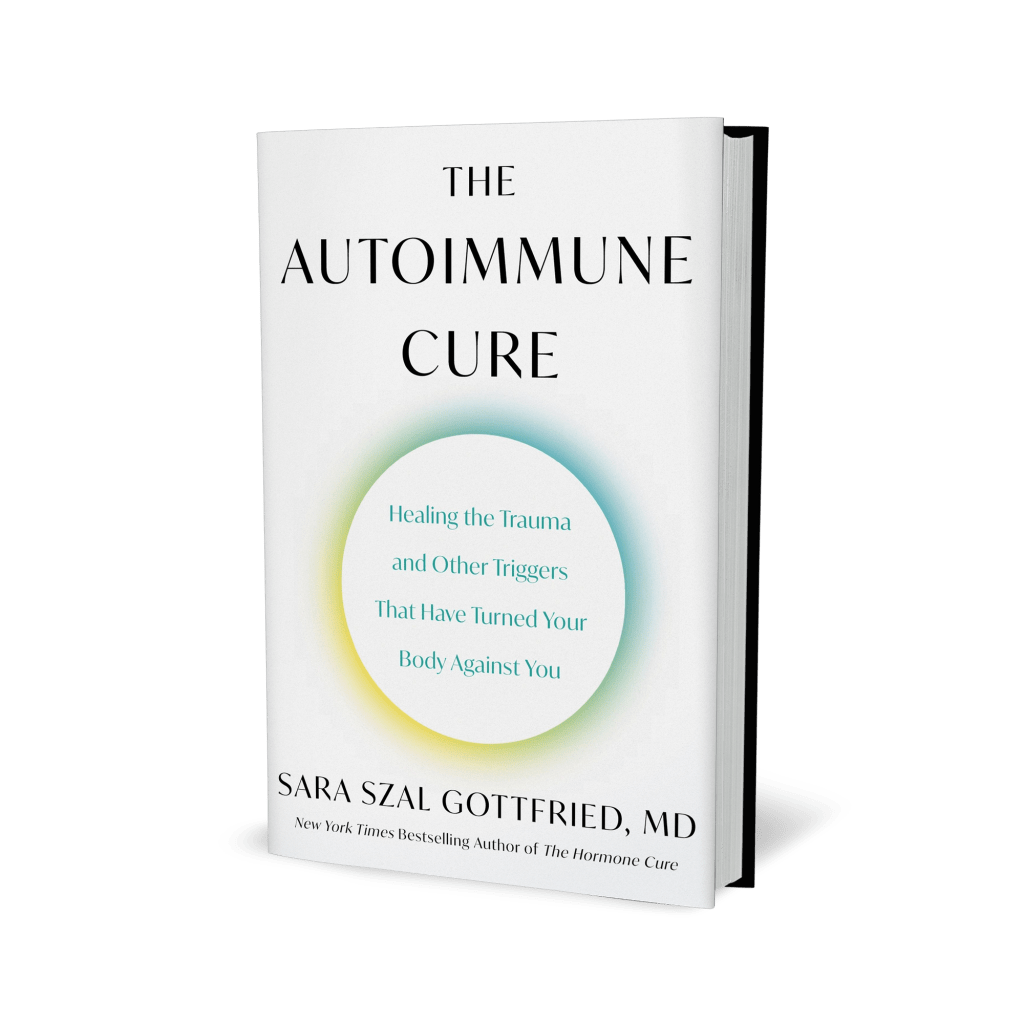It’s shocking to see the news that autoimmune conditions are skyrocketing. And 80 percent of cases are in women, according to research in Frontiers in Endocrinology. When the body attacks itself, as it does in these diseases, it most often harms our thyroid, joints or gut, wreaking havoc on our energy levels and weight.
Some experts estimate that as many as 50 million Americans currently suffer from autoimmune symptoms or have blood markers that indicate problems are brewing. “That’s an important opportunity to address the root causes and prevent or reverse the condition,” says Sara Gottfried, MD, a Harvard and MIT graduate who is focusing her efforts on this issue with her new book, The Autoimmune Cure. Keep reading to learn the latest news about autoimmune issues and the weight disruptions they can cause.
Surprising root cause of autoimmune issues and weight gain: trauma
In her work, Dr. Gottfried uncovered a crucial yet often-overlooked piece of the healing puzzle when it comes to autoimmune diseases and weight issues. She explains, “The more I worked with patients who had autoimmune issues—and battled my own—the more clearly I could see a powerful, underlying connection: trauma.” Indeed, Scottish researchers publishing in Bioscience Horizons find that developing most autoimmune conditions comes down to three factors: genetics, a leaky gut and/or, more surprisingly, a traumatic trigger.
Trauma can come in different forms to damage our health
It turns out trauma can mean more than we think. Dr. Gottfried says, “For trauma to trigger, it does not have to be cataclysmic, ‘big T’ trauma; it can be just as easily subtle, quiet, minor or insidious, ‘little t’ trauma.” That could be something as common as stress from a pregnancy, lack of sleep due to menopause, even long COVID. Stress alone is sometimes enough to trigger autoimmune disease in women. It is important to note, it’s not what happens to people, but how they interpret it that can signal stress, dysfunction and inflammation, explains Dr. Gottfried.
Trauma can be passed down in cells for generations
But it’s not just what happens in our lifetime that can affect our immunity and weight. Scientists find that trauma can be passed down in our genes for three generations, according to research conducted on animals at Emory University and published in Nature Neuroscience, as well as human studies following Holocaust survivors. Dr. Gottfried says, “You can be suffering even if you cannot name your trauma triggers.” One thing is crystal-clear: She says, hidden trauma “robs you not just of lifespan but also joy-span.”
Hidden trauma “robs you not just of lifespan but also joy-span,” says Sara Gottfried, MD
Carolyn Coker Ross, MD, MPH, is an expert in this area. Her popular TEDx Talk about Intergenerational Trauma and health went viral. She shares, “I’ve had two major periods in my life where I’ve had really serious health issues, including being diagnosed with chronic fatigue syndrome and autoimmune issues.” She shares, “I didn’t recognize how much was related to intergenerational trauma and growing up in the South during the Jim Crow era.” But it is possible to begin to heal from intergenerational damage.
Why are women at such high risk for autoimmune issues?
For starters, as with so many conditions, hormones play a role. Extreme hormonal transitions alter the immune system’s ability to adapt. The most common condition Dr. Gottfried sees is autoimmune thyroid disease, diagnosed in the postpartum period. Science also shows “perimenopause is associated with increased autoimmunity.” Secondly, women tend to internalize trauma more than men, leading to higher rates of anxiety, depression and insomnia. She adds, “Time and again, I see people who disregard their trauma, yet their body tells a different story.”
Autoimmune thyroid dysfunction and weight gain
There is a clear link between weight and autoimmune issues. In fact, our thyroid and the hormones it makes plays a powerful role in our metabolism. Up to 60 percent of obese adults have an autoimmune thyroid glitch, according to research published in the International Journal of Endocrinology. How does thyroid affect our weight? It’s complicated, but when stress hormones are high, it can cause malfunctions in the body-wide response system known as PINE: or the Psycho-Immune-Neuroendocrine network. When those important networks are weakened, it causes us to become sick and bloat up with damaging inflammation. It might lead to a domino effect of problems. Explains Dr. Gottfried, “Too much cortisol makes you gain belly fat, increases sugar cravings and brings other hormones out of balance, including thyroid hormones.”
The good news: Healing from autoimmune is possible
Dr. Gottfried created a protocol she used to heal herself and help clients dramatically improve their issues, even reverse thyroid conditions. “My symptoms—like mood swings, joint pain, fatigue, and chronic inflammation—disappeared within a few days,” she says. “I shifted from a state of pre-autoimmune disease to normal.”
Ashley Malik, 49, struggled with weight gain and other symptoms, due to thyroid troubles. Then she adopted an anti-inflammatory diet and lost 55 pounds, dropping 15 pounds the first month. Today, she says, “I believe my autoimmune conditions came about when I was struggling through an abusive marriage. I’m so glad Dr. Gottfried addresses this connection. Putting my Hashimoto’s into remission has given me my life back!”

Follow Dr. Sara Gottfried’s tips for autoimmune health
Use these steps to protect yourself. They can help relieve or prevent symptoms and shed trauma-packed pounds…
1. Take a quick quiz to gauge trauma exposure
Dr. Gottfried recommends filling out the free 10-question Adverse Childhood Experiences (ACE) questionnaire. It asks about things like whether your parents got divorced or you suffered any abuse growing up. Scores are based on a 0 to 10 scale.“People with an ACE score of 6 or higher have an increased risk for at least 21 autoimmune diseases,” Dr. Gottfried explains. (Her own score is 6.) Even women with a low score may still benefit from Dr. Gottfried’s advice, due to later-in-life stressors or hidden traumas.
2. Follow Dr. Gottfried’s diet for autoimmune weight loss tips
“Food may be the most important lever” when overcoming autoimmune symptoms, Dr. Gottfried says. The right foods dial down inflammation and repair the gut to boost immunity and release toxic fat. One patient, Radha, lost 36 pounds and improved her BMI from 28 to 22.
Phase 1: Cut out food stressors
Dr. Gottfried recommends a 21-day anti-inflammatory elimination diet, where you avoid potential irritants like gluten, sugar, dairy, processed foods and caffeine. “When you remove food-based triggers,” she says, “many of my patients experience remission.” She adds, “It takes a minimum of 21 days for the immune system to become less trigger-happy and reactive.”
Instead, focus on eating vegetables, fruit, healthy fats, SMASH fish (salmon, mackerel, anchovies, sardines and herring), nuts, seeds and lean meats. For breakfast, try shredded chicken scrambled with eggs and chopped chard on gluten-free avocado toast. At dinner, reach for salmon with artichokes.
Phase 2: Reintroduction
After 21 days, add one eliminated food back into your routine daily. If symptoms return, you’ll know to avoid that food in the future to protect your thyroid and body. Research from the Arthritis Connection shows up to 40 percent of autoimmune patients improve symptoms with this type of dietary protocol.
3. Use spice support to help with autoimmunity
Dr. Gottfried enlists powerful “immunomodulators”—things that improve our immune system response. One favorite: black cumin. A study conducted in Iran found that autoimmune thyroid patients who ingested black cumin—2 grams of the ground spice in capsules daily—lost weight, lowered their BMI and improved thyroid health in just eight weeks. So it is possible to achieve weight management with thyroid conditions and other autoimmune issues.
4. Reach for rest to reduce autoimmunity
Dr. Gottfried says, “Sleep is a way to prime your body for healing.” Once she restored her gut health, her deep sleep quality dramatically improved. And try sneaking relaxing activities into your days to dial down stress hormones: meditate for 20 minutes, get out in nature, read an inspiring book or socialize with friends. Dr. Gottfried also recommends a type of mindfulness-based somatic therapy called Hakomi. “Mind-body therapies seem to be the most important needle-mover.”
5. Work on healing trauma
With movement: When it comes to calming trauma and autoimmunity, Dr. Ross says, “Brain recovery is aided by repetitive movement.” Think regular exercise, tai chi, martial arts or a type of yoga called trauma-informed yoga.
With community: Try finding a support group. Dr. Gottfried used a 12-step program in her forties to gain a spiritual practice, boundaries and accountability. She calls these groups “an operation manual for the inevitable ups and downs of life.” It is even possible to begin healing from intergeneration trauma with these healthy, mindful steps.
Bonus tip: Even if trauma fuels overeating you can be a cycle breaker
Dr. Coker Ross explains that trauma may be driving our overeating
and weight issues. She says, “when people overeat, it is often caused by trauma… a need to numb the emotions and cope. Dieting doesn’t fix the problem. It’s a deeper issue.” The good news: Just as certain genes get turned “on” through trauma, they can get turned “off” again by healthy habits. So just by thinking mindfully and being aware of changes in the body, women can work to break the cycle for generations to come!
This content is not a substitute for professional medical advice or diagnosis. Always consult your physician before pursuing any treatment plan.




